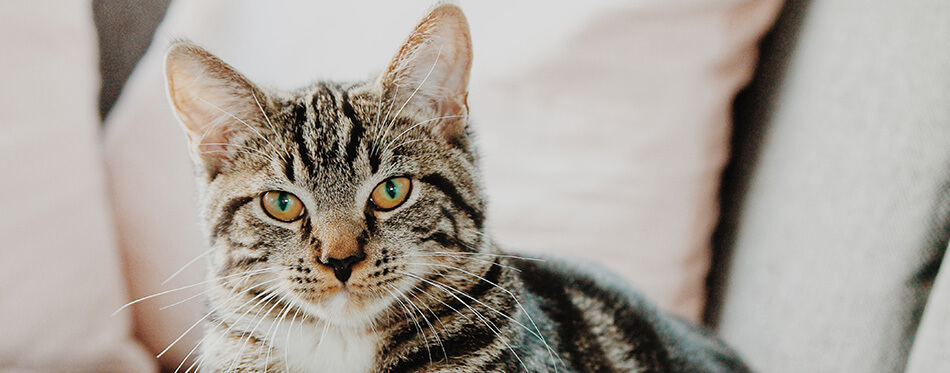There are plenty of common reasons that your cat may be seeking out more affection than usual. Cats may be extremely independent creatures, but even they have ever-changing behaviors that we humans have come to recognize. Many cat behaviors are based on their emotions, as well as their personality.
For example, if you have a clingy cat that suffers from anxiety, your cat is going to be more likely to do “annoying” actions, such as winding around your legs and constantly headbutting your hands when you’re on your phone. When cats are doing this type of thing, they are trying to get your attention. Whether that’s because they’re nervous, showing affection, or because they are very clingy… Well, you’ll need to look at their overall behavior to figure that one out. But we can help by showing you this list of clingy actions that cats sometimes do:
Signs of an Emotionally Needy Cat
- Following you around the house.
- Meowing when you close a door to a room they can’t come into with you.
- Shredding your carpet or furniture – especially if those items are by a bedroom door that you shut them out of.
- Rubbing their face or side against you all the time.
- Trying to follow you when you leave the house.
- Headbutting phones, laptops, controllers, or anything else you have in your hands or use a lot.
- Demanding attention by meowing at you, pushing their head against you, and harshly kneading your clothes or blankets.
Cats that are clingy like this are dependent on you. That’s not a particularly good thing because it adds to their stress when you aren’t in the room with them. They feel that they need to be close to you, and they rely on you for comfort. This can also make it difficult to have a multi-cat household because cats get jealous easily.
Your cat being needy may have happened over time. You might not even recall when they changed. This type of manipulative behavior can breed stress for both you and your cat.

Potential Reasons for Your Cat’s Clingy Behavior
- Low self-confidence
- Anxiety
- Stress
- New animals in the house (cats or dogs etc.)
- Trauma in their life before they came to live with you
- Health problems
- A visiting family member your cat doesn’t like
- Illness or injury
- Previous owners allowed overly clingy and dependent behavior
- Lack of mental stimulation/boredom
- Loneliness
- Your cat is dependent on you
How to Make Clingy Cats More Independent
With an excessively clingy cat, you can be the most understanding and loving owner, but you won’t be helping your cat regain their independence. Your cat’s neediness will have come from somewhere, but they can be encouraged to stop their super needy behavior.
Though many cats are naturally independent, you can help your needy cat feel more ready to face the world without you. Seek veterinary advice where appropriate – such as when you suspect that your cat could have underlying health problems that are causing their actions.
Step one: Give Affection in Moderation
Stopping a demanding cat that constantly wants your attention will take time and effort. Start by identifying any of your cat’s bad behavior and reprimanding them during those times. Never give your cat pets or scratches when they’ve been naughty.
Be prepared for your home to suffer a little damage as you try to correct your cat’s behavior. You should be ignoring a manipulative cat who is clawing your furniture or meowing to get your attention. Don’t distract them by giving them treats. Outright ignore them until they stop.
Your cat will only continue to be a demanding cat if you give in to their bad behavior.
Step two: Distance Yourself
Obviously don’t neglect your kitten. We mean for you to physically distance yourself from your cat. Consider it social distancing – but from your own pets. Your cat’s health depends on their ability to function without you. You need to teach them that you won’t always be there and that they’ll be fine when you aren’t.
Step three: Help Your Cat be Independent
Alongside practicing social distancing with your healthy cat, make your cat realize that they can enjoy their life without you by their side every minute of every day. Your kitty may feel insecure when left alone, so give them an enriched environment full of interactive toys or adopt a new kitten to be their friend while you aren’t home.
Remember to Discipline Your Cat
While you’re helping your pet with their anxiety of being without you, it’s good to remember how to discipline them when they are getting out of hand.
Striking your pet or yelling at them isn’t going to get you anywhere. Neither is putting them in a room by themselves. Cats don’t respond to this kind of discipline, and they’ll just make a big fuss later on when they’re upset with you.
Take a few minutes to pay attention to your cat when they’re misbehaving and have a water spray bottle nearby. Spray bottles are an effective way of getting your cat to stop their negative actions, and they’re a perfect example of a discipline that isn’t harmful to your cat.
Alternatively, you can talk to your cat in a stern, somewhat loud tone of voice. That should get their attention, but not all cats respond and may just ignore you at the same time.
Another form of discipline uses compressed air in place of a spray bottle. This incurs an extra cost that may seem frivolous to some, but it does work. You should never aim compressed air at your cat if you do decide to use it. Always spray away from the cat because it’s the noise that will stop them, while the air may frighten them or dry out their eyes.
Sensitive cats usually respond to quick, loud noises, such as clapping. However, startling your cat isn’t particularly kind and you may find them running up the cat tree to hide from the noise.
Does Your Cat Have Separation Anxiety?
All cat breeds can get separation anxiety if the conditions are right. A cat showing signs of this type of anxiety may refuse to use their cat bed, preferring to cuddle up with you or sleep in the same room as you, instead.
Separation anxiety causes clinginess in cats, leading to meowing, crying, excessive self-grooming, and many other issues. If you believe your cat may be suffering from this type of anxiety, seek advice from your vet and begin your research to find ways to help your cat.
Did You Become a Cat Owner During COVID-19?
Many cat owners who adopted their pets during the various lockdowns and work-from-home situations of the COVID-19 pandemic have noticed that their cats are incredibly clingy. If you think about it, your new cat has spent almost all of 2020 and most of 2021 with you. They’re used to having you around and will have become dependant on you for entertainment, company, and affection.
Pandemic kitties all share these traits. Even if you didn’t adopt your cats during lockdown, you’ve still spent most of the last two years at home with your kittens. You’ll need to put in a little more effort to help your cats become independent again now that the pandemic is calming down.

FAQs:
Q: Why is my cat clingy today?
A: Ask yourself if anything has changed in your cat’s environment that may have scared them or made them feel stressed out. Some cats who suddenly exhibit clingy behavior with their human may have experienced a shock or been startled. Not all cats hide away when they’re scared. If your cat is suddenly seeking comfort, give it to them.
Q: Does my cat need company?
A: Cats are often very independent and shouldn’t need someone with them throughout the day. However, cats do need stimulation, which is why a number of cats are housed together and not alone. Your cat may benefit from having another animal around when you aren’t home, but they could also benefit from having decent toys to play with.

